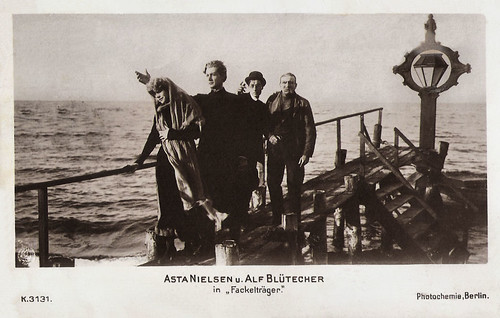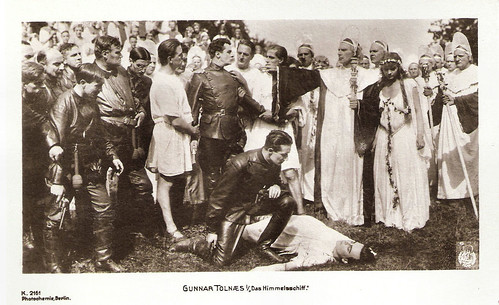
German postcard by Hermann Leiser, Berlin-Wilm., no. 5044. Photo: Nordisk.

German postcard by Photochemie, Berlin, no. K. 2148. Photo: Nordisk. Lilly Jacobsson as Marya, the Martian leader's daughter, Gunnar Tolnaes as Avanti Planetaros, and Alf Blütecher as his friend Dr. Krafft in Himmelskibet/Das Himmelschiff/A Trip to Mars (Holger-Madsen, 1918).

German postcard by Ross Verlag, Berlin, no. 995/2. Photo: Atelier Balazs, Berlin.
The mysterious stranger
Alf Wiborg Blütecher was born in 1880 in Lardal, Norway. His parents were Hjalmar Ingjald Frithjof Blütecher and Anna Dorothea Magdalena Wiborg. He began his career at the theatre in Bergen in 1904/1905 and then appeared in the home province: in Trondheim, Stavanger, and at 'Den nationale Scene' in Bergen again. One of his most famous stage roles was that of Peer Gynt in the eponymous play by Henrik Ibsen.
Eventually, Blütecher moved to Denmark, which was an important centre of the early silent film era. There he became a busy film actor in 1913. He played medium-sized and leading roles, such as Mephisto, the mysterious stranger in Holger-Madsen's eponymous film Den mystiske fremmede/A Deal with the Devil (1914), starring Olaf Fönss. It meant for Blütecher his first outstanding character role.
In particular, he was made famous by his depiction of Arno von Dotzky, the first husband of Martha (Augusta Blad), the main character in Ned med våbnene!/Lay Down Your Arms! (Holger-Madsen, 1914), the film adaptation of Bertha von Suttner's novel 'Die Waffen Nieder!'. In addition to Holger-Madsen, Robert Dinesen became Alf Blütecher's most important director, but he also acted several times in productions by the Danes A. W. Sandberg and August Blom.
Blütecher's roles ranged from the actor Poul Walter in En skæbne/A Fate (Margrete Bähncke, 1915), Jules Petit in I farens stund/In the Father's Hour (Robert Dinesen, 1915), the detective Tom Atkins in Juvelerernes skræk/The Horror of the Jewelers (Alexander Christian, 1915), to the chief of police Sylvester Jackson in Manden med de ni fingre/The Man with the Missing Finger, part 1 and II (A.W. Sandberg, 1915).
Other roles were the chief of account Halling in Alfred Cohn's Brandmandens datter/The Firefighter's Daughter (Alfred Cohn, 1915), squire Fasting in For sin faders skyld/For the Sake of his Father (Holger-Madsen, 1916), Colonel Lord Emmerich Douglas in Tempeldanserindens elskov/The Bayadere's Revenge (Holger-Madsen, 1915), and astronomer Professor Elvin Ross in I stjernerne står det skrevet/The New Star (Hjalmar Davidsen, 1915). But Blütecher also played engineers, botanists, plantation workers and in particular: doctors - again and again.

German postcard by Ross Verlag, Berlin, no. 628/4. Photo: Hella Moja Film. Hella Moja and Alf Blütecher in Das Spiel von Liebe und Tod (Urban Gad, 1919).

German postcard by Photochemie, Berlin, no. K. 3131. Photo: Nordisk. Asta Nielsen and Alf Blütecher in Mod lyset/Fackelträger/Towards the Light (Holger-Madsen, 1919).

German postcard by Photochemie, Berlin, no. K. 2134. Photo: Nordisk. Publicity still for Himmelskibet/Das Himmelschiff (Holger-Madsen, 1918) with Lilly Jacobsson as Marya, the Martian leader's daughter, Gunnar Tolnaes as Avanti Planetaros, and Alf Blütecher as his friend Dr. Krafft. Here the Martians, led by their leader (Philip Bech) and his daughter Marya, offer the earthlings their - vegetarian - food.
A trip to Mars
Until shortly after the end of the First World War, Alf Blütecher was visible in a plethora of Danish productions - mostly dramatic and melodramatic stories - by the Nordisk film company. Memorable was his part as ship's mate Reymers in Verdens Undergang/The End of the World (August Blom, 1916), an S-F classic precursor of films such as Deep Impact (Mimi Leder, 1998). The film depicts a worldwide catastrophe when an errant comet passes by Earth and causes natural disasters and social unrest. Director Blom and his crew created special effects for the comet disaster using showers of fiery sparks and shrouds of smoke. The film attracted a huge audience because of fears generated during the passing of Halley's comet six years earlier, as well as the ongoing turbulence and unrest of World War I.
Another important role was that of Dr. Krafft in another S-F film Himmelskibet/A Trip to Mars (Holger Madsen, 1918), starring Gunnar Tolnaes as Avanti Planetaros, who discovers that Mars is a pacifist planet. One of Blütecher's last Danish films at Nordisk was Mod lyset/Towards the Light (Holger-Madsen, 1918), in which he played a caring, honest priest who hosts the homeless, opposite Asta Nielsen as an idle aristocrat who comes to know fraud, hardship, and loss, and repents. It was Nielsen's last Danish film.
Finally, like many of his colleagues from Copenhagen before him, Alf Blütecher followed a call to Germany in the autumn of 1919. In 1915, he had already the first German collaboration in the Hella Moja vehicle, Das Spiel mit dem Tode/Das Spiel von Liebe und Tod (Urban Gad, 1915; but released only in 1919). In 1919, he took over the leading role in Fritz Bernhardt's Darwin (1920) in Hamburg. The following year, after another film in the Hanseatic city, Der Staatsanwalt/The Public Prosecutor (Paul Otto, 1920), Blütecher went to Berlin via Munich where he appeared in Das Rätsel im Menschen/The Riddle in Humans (Konrad Leitner, 1920).
In Berlin, he worked again and again under the direction of Danish colleagues. With Urban Gad, he made the horror film Die Insel der Verschollenen/The Island of the Lost (1921), with Svend Gade the rural drama Das Geheimnis von Brinkenhof/The Secret of Brinkenhof (1923) as the partner of Henny Porten, and again with Holger-Madsen Zaida, die Tragödie eines Modells/Zaïda (1923), with Gertrud Welcker. Blütecher returned to filming in Copenhagen for the comedy En nat i København/A Night in Copenhagen (Eduard Schnedler-Sørensen, 1923), to Hamburg for Die letzte Maske/The Last Mask (Emmerich Hanus, 1924) and to Munich for Der Favorit der Königin/The Queen's Favorite (Franz Seitz, 1922).
Afterwards, the Norwegian only had supporting roles, e.g. in films by Victor Janson and Friedrich Zelnik, but he had a last major part in the German late silent film Die Sünde der Lissy Krafft/The Sin of Lissy Krafft (F.W. Andersen, 1930), with Maly Delschaft in the title role. An accident as a result of which he struggled with persistent hearing loss suddenly ended Blütecher's film career. He then returned to his Norwegian homeland, settled in Oslo, and ended up hiring himself at the local post office. Alf Blütecher died in 1959 in Oslo, Norway. He was 79.

German postcard by Photochemie, Berlin, no. K. 2161. Photo: Nordisk. Publicity still for Himmelskibet/Das Himmelschiff (Holger-Madsen, 1918) with Gunnar Tolnaes as Avanti Planetaros, Philip Bech as the Martian leader, Lilly Jacobsson as Marya, the Martian leader's daughter, Alf Blütecher (kneeling) as his friend Dr. Krafft and Nils Asther as the fallen Martian.

German postcard by Photochemie, Berlin, no. K. 2152. Alf Blütecher as Dr. Krafft, Zanny Petersen as Corona Planetaros, Lilly Jacobsson as Marya, Gunnar Tolnaes as Avanti Planetaros, and Nicolai Neiiendam as professor Planetaros, father of Corona and Avanti, in the Danish science-fiction film Himmelskibet/A Trip to Mars (Holger-Madsen, 1918).

German postcard by Verlag Hermann Leiser, Berlin, no. 7480. Photo: Nordisk.
Sources: Wikipedia (German and English), and IMDb.
This post was last updated on 10 June 2023.
No comments:
Post a Comment